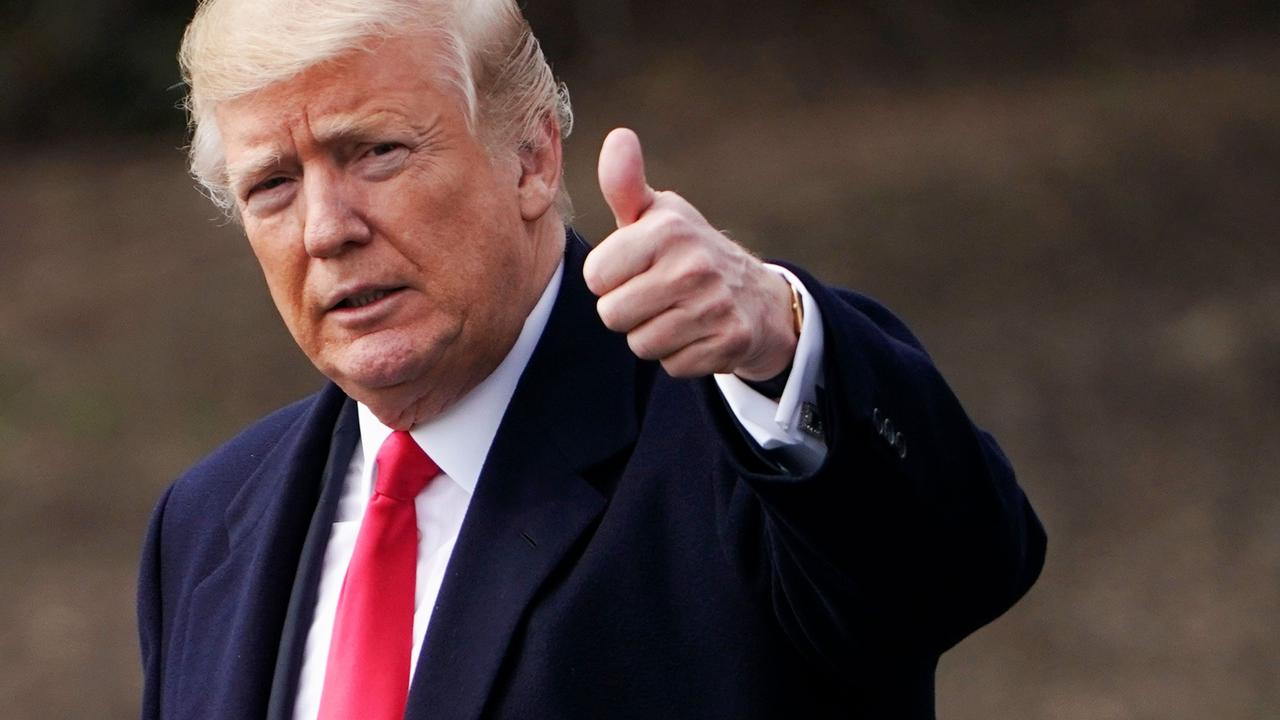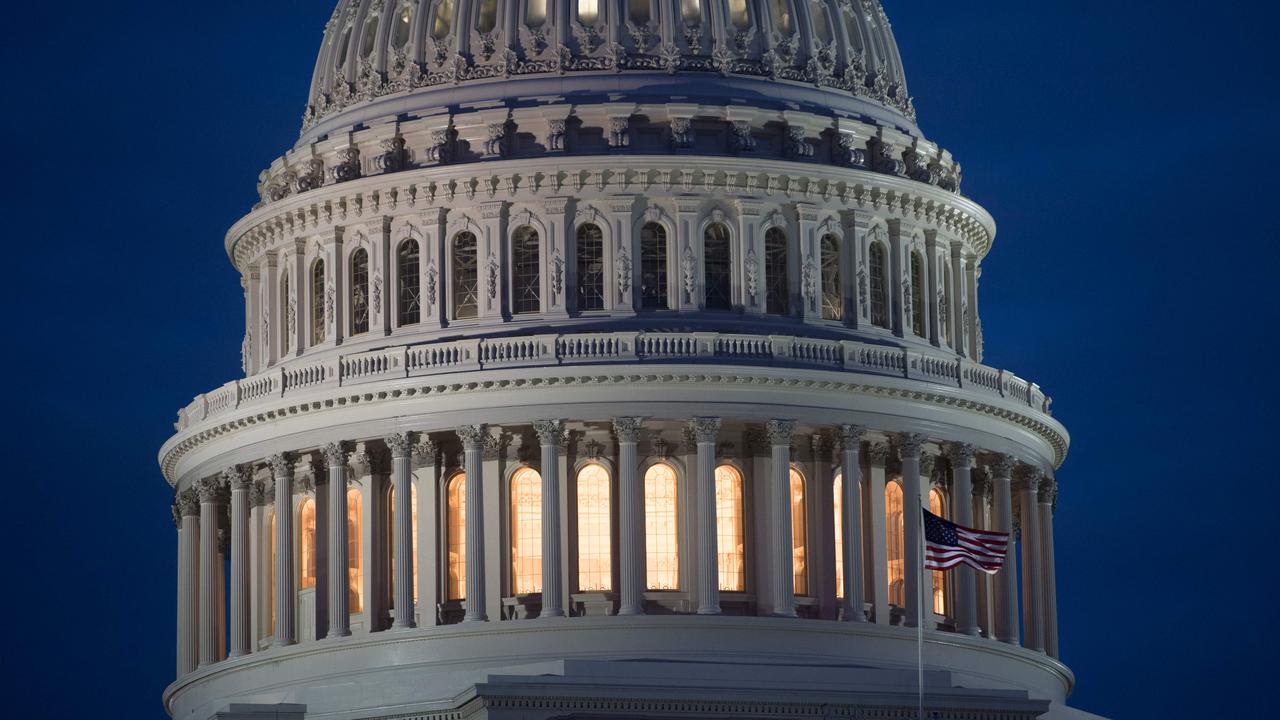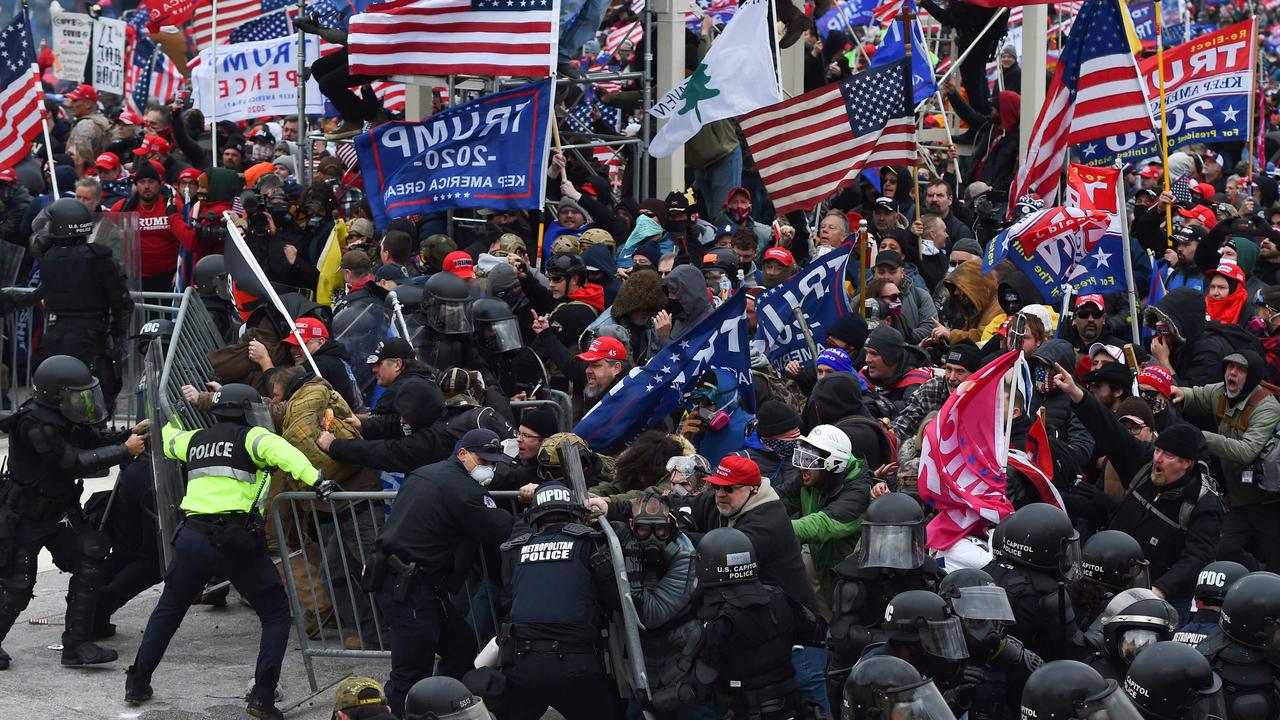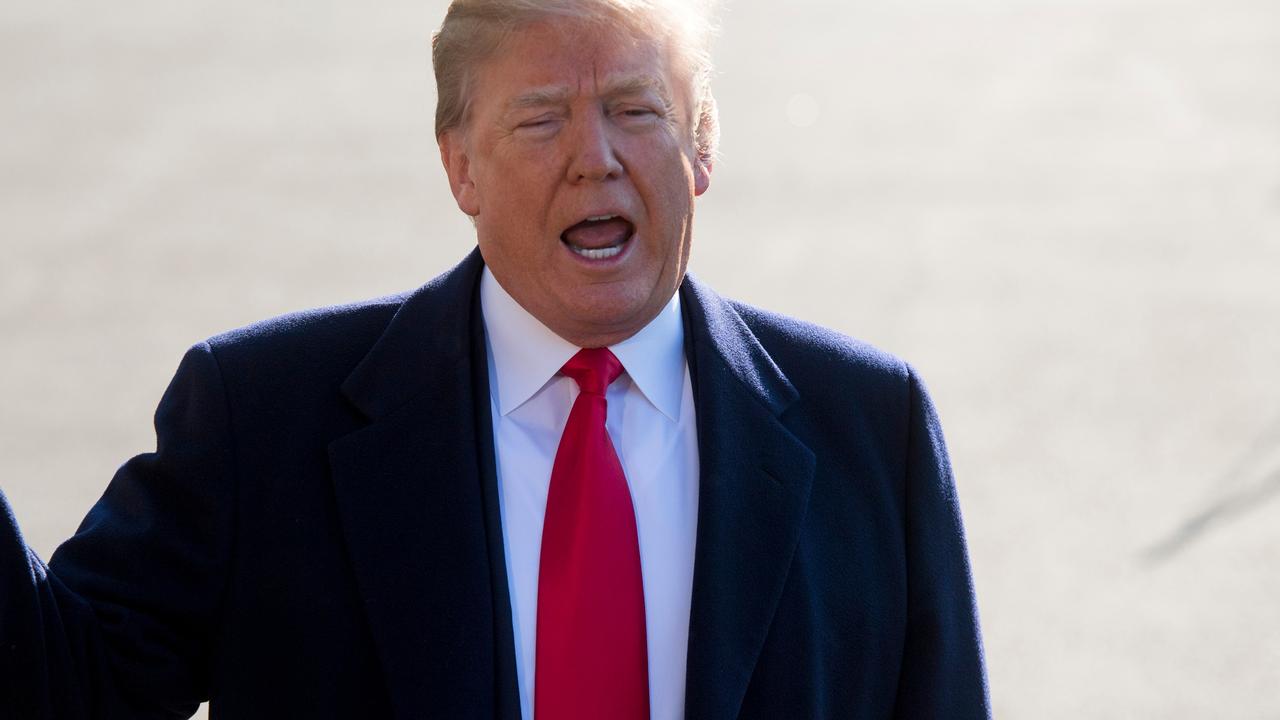The key sign that Donald Trump will be acquitted in next week’s impeachment trial
The second impeachment trial of Donald Trump hasn’t even started, but we have already seen a clear sign that he will escape conviction.
The impeachment trial of Donald Trump will begin in the US Senate on Tuesday, with the former president’s political future at stake.
If convicted, Mr Trump could also be barred from running for office again, ending any prospect of him reclaiming his old job four years from now.
That is what his political opponents, the Democrats, are pushing for. The more likely result, however, is that Mr Trump’s second impeachment trial will end the same way as his first – with his acquittal.
Both sides filed legal briefs this week laying out their arguments, and we already have a fair idea of how most senators will vote.
Read on for everything you should know heading into the trial.
RELATED: Troubling sign in Joe Biden’s first days as President

HOW THE IMPEACHMENT TRIAL WORKS
The House of Representatives passed a single article of impeachment against Mr Trump last month, by a margin of 232-197. Now the House, represented by nine impeachment managers, will act as the prosecution in his trial.
Those managers were chosen by Speaker Nancy Pelosi, and they’re all Democrats. They are led by Maryland Congressman Jamie Raskin, who is a lawyer by trade.
Mr Trump, meanwhile, will be represented by lawyers David Schoen and Bruce Castor, who took the gig just a week ago after the former president’s previous legal team quit.
The trial will take place in the Senate, with the 100 US senators acting as its jurors.
As a first step, the Senate will vote on a resolution confirming the exact structure of the proceedings. Expect this to include an allotment of time for the prosecution and defence to make opening arguments, a period for the senators to ask questions of the two sides, and then closing arguments to finish things off.
The Democrats might decide to call witnesses as well, which would obviously lengthen the process. We don’t yet know whether that will happen.
This week, the impeachment managers did request that Mr Trump himself testify under oath, but his legal team refused, dismissing the demand as a “stunt”.
When it’s all over, the Senate will vote.
The big number to keep in mind here is 67 – that is the threshold for conviction. The chamber is currently split 50-50 between Republicans and Democrats, meaning at least 17 members of Mr Trump’s own party would need to vote against him.
If Mr Trump were still president, conviction would result in his removal. Obviously that isn’t possible, as he has already left office.
So, why bother? Because if he is found guilty, there will be an additional vote to disqualify him from seeking office again.
That would only require a simple majority of 51, meaning the Democrats could do it on their own, with Vice President Kamala Harris stepping in to cast the tiebreaking vote if necessary.
If he’s acquitted, Mr Trump will of course continue to enjoy all the privileges of a former president, which include an annual travel allowance and a pension. He will also be free to run for office again.
You might be wondering how long the trial will take. History doesn’t give us much of a guide here, as only three impeachment trials have ever been held for US presidents, but the shortest of them (Mr Trump’s first trial last year) took 21 days.
The subject matter in that trial was a little more complicated. It revolved around Mr Trump’s efforts behind the scenes to pressure Ukraine into announcing an investigation of Joe Biden, who was regarded as his chief political opponent.
This time, the facts of the case are clearer, so we could be looking at a trial that takes days rather than weeks.

WHAT TRUMP IS ACCUSED OF DOING
The charge against the former president is “incitement of insurrection”.
It concerns Mr Trump’s conduct on and before January 6, when thousands of his supporters stormed the Capitol in an attempt to stop Congress from counting the electoral votes and confirming his election defeat to Mr Biden.
“The facts are compelling and the evidence is overwhelming. After months of spreading his Big Lie that he won a landslide victory in the 2020 election, leading up to and on January 6, President Trump summoned, assembled and incited a violent mob that attacked the Capitol, cost the lives of three police officers and four other people, threatened the vice president and Congress, and successfully halted the counting of the electoral college vote,” the House’s impeachment managers said in their brief this week.
“President Trump’s effort to extend his grip on power by fomenting violence against Congress was a profound violation of the oath he swore.
“If provoking an insurrectionary riot against a joint session of Congress after losing an election is not an impeachable offence, it is hard to imagine what would be.”
Mr Trump will also be called to answer for his response to the riot, with the prosecution arguing he deliberately ignored his duty to protect the US government.
“As armed insurrectionists breached the Capitol – and as Vice President Pence, the Congress,
and the Capitol Police feared for their lives – President Trump was described by those around him as ‘borderline enthusiastic because it meant the certification was being derailed,’” the brief claims, citing media reports.
“Senior administration officials described President Trump as ‘delighted’ and reported that he was ‘walking around the White House confused about why other people on his team weren’t as excited as he was.’
“These feelings were reflected in President Trump’s actions (and inactions) over the following hours, which reveal an extraordinary, unprecedented repudiation of the president’s duties to protect the government.”
It goes on to provide a timeline of Mr Trump’s reaction, including his initial tweet that Mr Pence “didn’t have the courage to do what should have been done” – sent as his supporters were clashing with police – and his attempt to lobby members of Congress to vote against certifying the election result while they were still being held in a secure location.
“The President did not take any action at all in response to the attack until 2:38pm,” the impeachment managers note.
The whole brief is 77 pages long. You can read it here.

TRUMP’S CORE DEFENCE
Mr Trump’s lawyers also filed a brief this week, which laid out the core argument they intend to mount in his defence. It’s a simple one: Mr Trump is no longer president, therefore the trial is unconstitutional.
“The constitutional provision requires that a person actually hold office to be impeached,” the brief declares.
“Since the 45th president is no longer president, the clause ‘shall be removed from office’ is impossible for the Senate to accomplish, and thus the current proceeding before the Senate is void.”
This is the same argument we have heard from a number of Republican senators in the lead-up to the trial, and you can see why it’s compelling. It gives them a path to acquittal that does not require them to excuse Mr Trump’s conduct on January 6.
Should enough Republicans disagree, however, Mr Trump’s team is also disputing the substance of the charge against him.
“It is denied that the 45th president of the United States ever engaged in a violation of his oath of office. To the contrary, at all times, Donald J. Trump fully and faithfully executed his duties as president, and at all times acted to the best of his ability to preserve, protect and defend the Constitution, while never engaging in any high crimes or misdemeanours,” says the defence’s brief.
“It is admitted that after the November election, the 45th president exercised his First Amendment right under the Constitution to express his belief that the election results were suspect.
“Insufficient evidence exists upon which a reasonable jurist could conclude that the 45th president’s statements were accurate or not, and he therefore denies they were false.
“It is denied that President Trump incited the crowd to engage in destructive behaviour. It is denied that the phrase, ‘If you don’t fight like hell, you’re not going to have a country anymore,’ had anything to do with the action at the Capitol as it was clearly about the need to fight for election security in general, as evidenced by the recording of the speech.
“It is denied that President Trump intended to interfere with the counting of electoral votes.”
You can read the full brief here. Mercifully, this one is only 14 pages long.

KEY SIGN THE TRIAL IS ‘DEAD ON ARRIVAL’
The question of whether a former president can be tried and convicted by the Senate is going to be a key obstacle for the Democrats, and perhaps an insurmountable one.
Last week, we got a clear look at where all 100 senators currently stand on the issue, as Republican Rand Paul put forward a motion which would have declared the trial unconstitutional.
It was defeated 55-45, with the Democrats unanimously opposing it. Just five Republicans followed suit: Mitt Romney, Susan Collins, Ben Sasse, Lisa Murkowski and Pat Toomey.
Remember the key number we mentioned earlier – it will take 67 votes to convict Mr Trump. Fifty-five is nowhere near enough.
Essentially, as we head into the trial, the Democrats need to convince at least a dozen Republican senators who think the whole event is unconstitutional to change their minds.
They are clearly conscious of the challenge, as the impeachment managers’ brief this week directly addressed the Trump team’s argument.
“President Trump committed this high crime and misdemeanour amid his final days in office. Given the clarity of the evidence and the egregiousness of his wrongdoing, the House approved an article of impeachment for incitement of insurrection,” it said.
“Now, merely weeks later, President Trump will argue that it serves no purpose to subject him to a trial and that the Senate lacks jurisdiction to do so. He is mistaken.
“As scholars from diverse viewpoints have long recognised, the text and structure of the Constitution, as well as its original meaning and prior interpretations by Congress, overwhelmingly demonstrate that a former official remains subject to trial and conviction for abuses committed in office. Any other rule would make little sense.
“The Constitution governs the first day of the president’s term, the last day, and every moment in between. Presidents do not get a free pass to commit high crimes and misdemeanours near the end of their term.
“The framers of our Constitution feared more than anything a president who would abuse power to remain in office against the will of the electorate. Allowing presidents to subvert elections without consequence would encourage the most dangerous of abuses.
“Failure to convict would embolden future leaders to attempt to retain power by any and all means, and would suggest that there is no line a president cannot cross.”
You can expect the Democrats to bolster their argument by citing the prevailing opinion among legal experts.
Last month, about 150 prominent constitutional law scholars from across the political spectrum signed a letter concluding Congress did indeed have the power to impeach and convict a former official, including a president, under the Constitution.
But that view is not unanimous in the legal profession, and there is no precedent for trying a president after he has left office. It has never happened before.
Speaking after his motion was defeated last month, Mr Paul said the result showed “impeachment is dead on arrival” in the Senate.
“If you voted that it was unconstitutional, then how in the world would you ever hope to convict somebody for this?” he asked.
“Forty-five of us, almost the entire Republican caucus, voted that the whole proceeding was unconstitutional. This is a big victory.
“The Democrats can beat this partisan horse as long as they want. This vote indicates it’s over. The trial is all over.”




